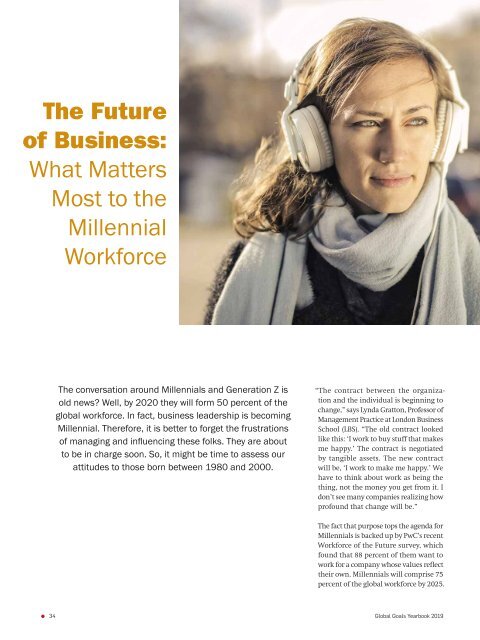Aliging Profit with Purpose - Global Goals Yearbook 2019
What are companies for? The rules for companies have changed. The focus is increasingly on their sustainable, social, and ecological impacts. The strategic orientation toward the so-called corporate purpose is decisive for profitable growth in the future. This currently results in a large number of questions for businesses: How do you find an inspiring and future-oriented corporate purpose, and how can it be aligned in such a way that it brings profitable growth and social responsibility in concert? The new 2019 edition of the Global Goals Yearbook offers answers to these crucial questions thanks to its consistent orientation toward the UN Sustainable Development Goals and a competent editorial board and author pool.
What are companies for? The rules for companies have changed. The focus is increasingly on their sustainable, social, and ecological impacts. The strategic orientation toward the so-called corporate purpose is decisive for profitable growth in the future.
This currently results in a large number of questions for businesses: How do you find an inspiring and future-oriented corporate purpose, and how can it be aligned in such a way that it brings profitable growth and social responsibility in concert? The new 2019 edition of the Global Goals Yearbook offers answers to these crucial questions thanks to its consistent orientation toward the UN Sustainable Development Goals and a competent editorial board and author pool.
You also want an ePaper? Increase the reach of your titles
YUMPU automatically turns print PDFs into web optimized ePapers that Google loves.
The Future<br />
of Business:<br />
What Matters<br />
Most to the<br />
Millennial<br />
Workforce<br />
The conversation around Millennials and Generation Z is<br />
old news? Well, by 2020 they will form 50 percent of the<br />
global workforce. In fact, business leadership is becoming<br />
Millennial. Therefore, it is better to forget the frustrations<br />
of managing and influencing these folks. They are about<br />
to be in charge soon. So, it might be time to assess our<br />
attitudes to those born between 1980 and 2000.<br />
“The contract between the organization<br />
and the individual is beginning to<br />
change,” says Lynda Gratton, Professor of<br />
Management Practice at London Business<br />
School (LBS). “The old contract looked<br />
like this: ‘I work to buy stuff that makes<br />
me happy.’ The contract is negotiated<br />
by tangible assets. The new contract<br />
will be, ‘I work to make me happy.’ We<br />
have to think about work as being the<br />
thing, not the money you get from it. I<br />
don’t see many companies realizing how<br />
profound that change will be.”<br />
The fact that purpose tops the agenda for<br />
Millennials is backed up by PwC’s recent<br />
Workforce of the Future survey, which<br />
found that 88 percent of them want to<br />
work for a company whose values reflect<br />
their own. Millennials will comprise 75<br />
percent of the global workforce by 2025.<br />
34 <strong>Global</strong> <strong>Goals</strong> <strong>Yearbook</strong> <strong>2019</strong>

















